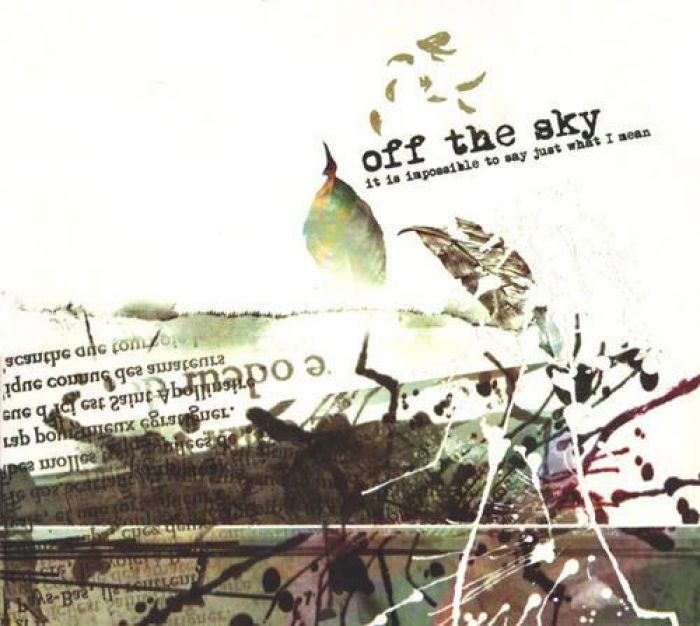It Is Impossible to Say Just What I Mean by Off The Sky (Review)

A constant temptation that one has whenever they’re writing about art is to try and read more into a work than what is probably warranted. And when the art in question is as abstract as Off The Sky’s glitchy brand of guitar drones and processed ambience, the temptation is doubly strong. But Jason Corder makes it even more tempting by pre-attaching fascinating concepts to his releases.
For example, Caustic Light EP interwove the notion of caustic lights — strange, rippling light effects that play across certain surfaces — with dreams from Corder’s youth to serve as an “ambiguous story from the last moment memories of an old man as his soul escapes.” And before that, Studies Of Lifeform In Transit was, in Corder’s own words, “a DSP-manipulation concept piece based around my visual and mental explorations of the often chaotic and unpredictable seasonal climates here in Kentucky where I live.”
So now we have Corder’s latest release, It Is Impossible to Say Just What I Mean, an album whose titles are inspired by T.S. Eliot’s “The Love Song of J. Alfred Prufrock.” Eliot’s poem dwelt on the fragile balance between man’s need for intimacy and connection, and man’s inability to truly cross the gulf that separates individuals, all delivered in the guise of one man’s regret at never having expressed his love for a nameless woman.
As pretentious as it might sound, it’s a perfect match for Corder’s ephemeral music, as there is this constant sense of the music, like true human connection, lying just outside one’s reach. That no matter how much the listener might “figure out” Corder’s illusory compositions, they still ultimately remain just on the periphery of the their awareness, cloying and teasing with barely-there wisps of sound and deconstructed melodies that nevertheless manage to coalesce into moments of billowing loveliness.
And in keeping with the theme of Eliot’s poem, vocal snippets float throughout the recording, be it Lina Tharsing humming to herself on “Faint, Wishful Thinking” or the snatches of conversation that float, once again, on the periphery of “Farther From Where We Came.” Corder’s music is all about inference, and here, it’s the inference that whole worlds of communication are taking place outside of the songs’ spaces, with only scratches and pieces making it through Corder’s kaleidoscopic processing. It’s a curious feeling, and one that leaves you curiously melancholy, nostalgic for something — only you’re rather unsure as to what it is.
Enough of the conceptual mumbo-jumbo, though. What of the music? Well, keep in mind that “music” is a relative term here. What is so intriguing about Off The Sky’s music is the way it teases your subconscious, offering you a collage of sounds that seems absolutely random. But there are wisps and particles of structure, phantoms of potential melodies, all of them as gorgeous and fragile as a newly-formed icicle. The songs never evolve in a predictable manner. You think you’ve inferred where and how the structure will emerge, only to be caught delightfully off guard by where and how the structure actually emerges.
The album’s opening track, “Farther From Where We Came,” is the stereotypical Off The Sky composition; all of the sonic elements — drifting, cloud-like atmospherics, ghostly conversational samples, glittering fragments of guitar — are there. But it’s also one of Corder’s most beautiful compositions, the way the sounds billow out so effortlessly only to be gently guided back by Corder’s manipulation in time for an affecting, reassuring climax.
One can almost imagine Björk chiming in from Vespertine on “A Matter Of Feeling,” especially once the playful tones and vaguely-oriental pluckings begin a little parade beneath swirling, aurora-like drones. Try not picturing Bark Psychosis’ Graham Sutton and the fellows from Hood finding lots to like in the nocturnal atmospherics that filter through and make “Lonely Face, Passers By” so haunting. And although Corder has stated that he’ll no longer record under his dub moniker Zen Savauge, phantoms of Zen Savauge’s twilit, glitch-riddled rhythms can be heard shuffling just below the surface of “Elliott Goodbye, Denouement” and “Gently Down The Stream.”
The whole time you listen to these songs, you find yourself both lulled and befuddled. Lulled by the serene drifts of sound, but befuddled as to how these mercurial sounds manage to come together. What’s more, the sounds become such that you find yourself wondering if what you’re hearing actually exists at all, or if it’s just some stray overtone, or the echoes of some pattern or fragment you just missed.
I find this music far more demanding of my attention than anything that’s “in your face,” as it’s the little nuances that mean all the world. But at the same time, I’m also painfully aware that there will always be some element of the song that eludes my grasp, that remains just outside of my awareness, a missing piece that might make everything even more beautiful than it is. What a beautifully elegiac experience. I suspect it’s a feeling that Eliot’s protagonist knew all too well in his lament.